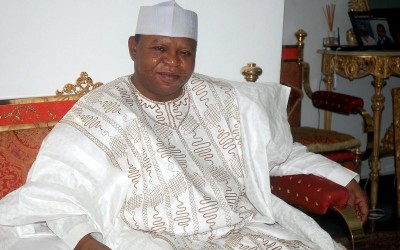The presiding judge in the four suits challenging the outcome of the governorship election, and the scheduled supplementary election, Gabriel Kolawole, said he struck out the suits for lack of jurisdiction.
Mr. Kolawole, presiding over the suits at the Federal High Court Abuja, affirmed the powers of the Independent National Electoral Commission to conduct the two elections and said he decided to strike out the suits to provide a judicial and permissive environment for the electoral body to conclude the election.
The judge said he had considered both written and oral addresses of all counsel to the parties in the consolidated cases and came to the conclusion that all the “issues raised are those that a governorship election tribunal should look at holistically”.
He also said the court did not decide on the merits of the cases owing to the lack of jurisdiction, adding, “where this court has jurisdiction, it would dispense justice to the parties in the suit”.
The judge had earlier highlighted the cases that were consolidated to include the one filed by the deputy governorship candidate of the late Abubakar Audu of All Progressives Congress, James Faleke, with suit number FHC/ABJ/CS/977/2015.
Mr. Faleke asked the court to both declare the decision of INEC to conduct a supplementary election as null and void and announce him the governor-elect of Kogi state.
Another suit filed by incumbent Governor Idris Wada of the Peoples Democratic Party with number FHC/ABJ/CS/962/2015 was asking the court to compel INEC to declare him winner of the November 21 election, on the grounds that he scored the second highest votes after the late Mr. Audu.
The third suit FHC/ABJ/CS/973/2015 that was filed by Emanuel Daiko, candidate the People for Democratic Change, who wants the court to stop the supplementary election and remove the APC from the list of participating political parties having lost its candidate.
The fourth suit filed by one Raphael Igbokwe was asking the FHC to simply annul the election and order a fresh one.
Mr. Kolawole said after the adoption of written addresses on December 3, counsels agreed on five facts, which include: that the current constitution of Nigeria does not recognize an independent candidate for any election; that each governorship candidate must be sponsored by a political party and that a governorship candidate must emerge from a primary election.
He also said another fact that emerged was that every governorship candidate must have a deputy to run as a joint ticket and that both the Constitution and the Electoral Act provide for a timeline in which elections must be held.
Mr. Kolawole said the present scenario emerged, not because of the death of late Mr. Audu, but because the November 21 election was declared inconclusive.
Mr. Kolawole said having listened to all the submissions by counsels, he pondered over “which of these reliefs being sought can be entertained by the Federal High court?”
He said going ahead to grant the reliefs would amount to “judicial anarchy” and that only a competent tribunal can do so.
“Once electorates have gone to vote, anything else can only be heard by tribunals,” he said.
The judge blamed the political class for rushing to the Federal High Court or State High Court to seek for elections to either be annulled or re run.
“Majority of the political class are bad losers, except for one or two examples. For instance, former Governor Kayode Fayemi of Ekiti and former President Goodluck Jonathan. Both of them in my view are men of exemplary character,” he said.
Mr. Kolawole also stated that his review of submissions by counsels revealed that the fourth defendant, the INEC, may have been led or misled by a “partisan or otherwise legal opinion” of the Attorney General of the Federation, AGF.
The AGF, immediately after the death of Mr. Audu, advised INEC to allow the APC replace its dead candidate.
Mr. Kolawole said to prove the partisan status of the AGF, he was sued as a defendant in three of the four cases under consideration “in a contest that is not an exclusively APC affair, but multi party/public interest.
“It was not a matter which involved the exercise of governmental power conferred by the constitution on any organ or institution of the Federal government of Nigeria,” he said.
“The fact that he publicly advised INEC further saturated the political situation that got the fourth defendant to conduct the supplementary election and directed the third defendant; that is APC, to substitute its late governorship candidate, who already had a deputy in waiting,” he said.
He said it will amount to an act of “judicial indulgence” if the court, without jurisdiction to make affirmative pronouncement, declares the incumbent governor as having been duly re-elected even though he had the second highest votes cast, or to cancel the election or to stop the supplementary election.
He also said there was no need for him to proceed further with judicial consideration of all the three matters under saying “to do so would put the governorship tribunal in some difficulty” when eventually, the contestants to the supplementary election fixed for December 5 come before it.
Mr. Kolawole said the tribunal was best suited to entertain all the issues because they are issues relating to post primary and elections proper.
The judge said the primary goal of his judgment is to “to diffuse the dark cloud of doubt” regarding the validity of the Kogi elections.
Mr. Kolawole also said his judgment cannot be used before the tribunal whenever it is set up because the court has not decided on the consolidated cased based on their merits.
END


Be the first to comment